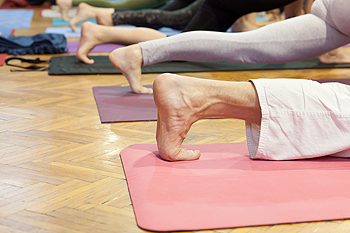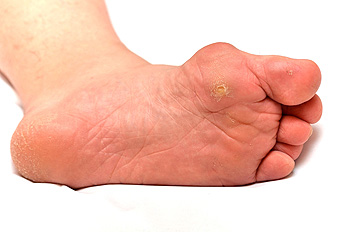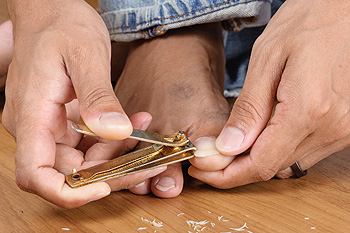North Andover (978) 686-7623
Tewksbury (978) 640-1010
Blog
 When proper care of the feet and ankles are maintained, the overall health of the body may be positively affected. The alignment of the body is affected by how we walk and stand, and research has shown that practicing yoga may be an option in ensuring the body remains strong. If the feet are not properly cared for, specific foot conditions may develop as a result of this, possibly including heel spurs, bunions, or plantar fasciitis. There are several parts of the feet that may be strengthened as a benefit of a yoga practice, and these may include the inner and outer heel, in addition to the pinky and big toe mound areas. An important portion of performing yoga includes standing with the feet flat on the floor and making sure the weight of the body is evenly distributed on the four corners of the foot. When this is accomplished, lift the arches. This may strengthen the muscles of the ankles and feet. If you would like additional information about the benefits of stretching the feet, speak to a podiatrist.
When proper care of the feet and ankles are maintained, the overall health of the body may be positively affected. The alignment of the body is affected by how we walk and stand, and research has shown that practicing yoga may be an option in ensuring the body remains strong. If the feet are not properly cared for, specific foot conditions may develop as a result of this, possibly including heel spurs, bunions, or plantar fasciitis. There are several parts of the feet that may be strengthened as a benefit of a yoga practice, and these may include the inner and outer heel, in addition to the pinky and big toe mound areas. An important portion of performing yoga includes standing with the feet flat on the floor and making sure the weight of the body is evenly distributed on the four corners of the foot. When this is accomplished, lift the arches. This may strengthen the muscles of the ankles and feet. If you would like additional information about the benefits of stretching the feet, speak to a podiatrist.
Stretching the feet is a great way to prevent injuries. If you have any concerns with your feet consult with one of our podiatrists from Foot Health Center of Merrimack Valley. Our doctors will assess your condition and provide you with quality foot and ankle treatment.
Stretching the Feet
Stretching the muscles in the foot is an important part in any physical activity. Feet that are tight can lead to less flexibility and make you more prone to injury. One of the most common forms of foot pain, plantar fasciitis, can be stretched out to help ease the pain. Stretching can not only ease pain from plantar fasciitis but also prevent it as well. However, it is important to see a podiatrist first if stretching is right for you. Podiatrists can also recommend other ways to stretch your feet. Once you know whether stretching is right for you, here are some excellent stretches you can do.
- Using a foam roller or any cylindrical object (a water bottle or soda can will do), roll the object under your foot back and forth. You should also exert pressure on the object. Be sure to do this to both feet for a minute. Do this exercise three times each.
- Similar to the previous one, take a ball, such as a tennis ball, and roll it under your foot while seated and exert pressure on it.
- Grab a resistance band or towel and take a seat. If you are using a towel, fold it length wise. Next put either one between the ball of your foot and heel and pull with both hands on each side towards you. Hold this for 15 seconds and then switch feet. Do this three times for each foot.
- Finally hold your big toe while crossing one leg over the other. Pull the toe towards you and hold for 15 seconds. Once again do this three times per foot.
It is best to go easy when first stretching your foot and work your way up. If your foot starts hurting, stop exercising and ice and rest the foot. It is advised to then see a podiatrist for help.
If you have any questions, please feel free to contact one of our offices located in North Andover, and Tewksbury, MA . We offer the newest diagnostic and treatment technologies for all your foot care needs.
 Research has shown that heel pain is considered to be the most common form of pain in the feet. There may be several reasons why this type of pain may occur, including an injury that has happened to the Achilles tendon, a condition that is referred to as plantar fasciitis, in addition to heel spurs. If this type of pain is caused by an injury, the pain will most likely be sudden and severe. If an injury did not occur, heel pain may be experienced gradually, which may often lead to severe discomfort. A common reason why heel pain begins may be related to the type of shoes that are worn, which may lead to additional foot conditions developing. If you are experiencing any type of heel pain, it is strongly suggested to consult with a podiatrist who can determine the reason for this, and to discuss correct treatment options.
Research has shown that heel pain is considered to be the most common form of pain in the feet. There may be several reasons why this type of pain may occur, including an injury that has happened to the Achilles tendon, a condition that is referred to as plantar fasciitis, in addition to heel spurs. If this type of pain is caused by an injury, the pain will most likely be sudden and severe. If an injury did not occur, heel pain may be experienced gradually, which may often lead to severe discomfort. A common reason why heel pain begins may be related to the type of shoes that are worn, which may lead to additional foot conditions developing. If you are experiencing any type of heel pain, it is strongly suggested to consult with a podiatrist who can determine the reason for this, and to discuss correct treatment options.
Many people suffer from bouts of heel pain. For more information, contact one of our podiatrists of Foot Health Center of Merrimack Valley. Our doctors can provide the care you need to keep you pain-free and on your feet.
Causes of Heel Pain
Heel pain is often associated with plantar fasciitis. The plantar fascia is a band of tissues that extends along the bottom of the foot. A rip or tear in this ligament can cause inflammation of the tissue.
Achilles tendonitis is another cause of heel pain. Inflammation of the Achilles tendon will cause pain from fractures and muscle tearing. Lack of flexibility is also another symptom.
Heel spurs are another cause of pain. When the tissues of the plantar fascia undergo a great deal of stress, it can lead to ligament separation from the heel bone, causing heel spurs.
Why Might Heel Pain Occur?
- Wearing ill-fitting shoes
- Wearing non-supportive shoes
- Weight change
- Excessive running
Treatments
Heel pain should be treated as soon as possible for immediate results. Keeping your feet in a stress-free environment will help. If you suffer from Achilles tendonitis or plantar fasciitis, applying ice will reduce the swelling. Stretching before an exercise like running will help the muscles. Using all these tips will help make heel pain a condition of the past.
If you have any questions please contact one of our offices located in North Andover, and Tewksbury, MA . We offer the newest diagnostic and treatment technologies for all your foot and ankle needs.
 The noticeable symptom of a bunion is a large and hardened bump that forms at the base of the big toe, and many patients consider this to be a bone disorder, which may gradually worsen. The bones in the feet and toes may become affected as a result of this deformity, and it may cause the feet to line up incorrectly. This bump that typically develops on the side of the big toe may push that toe into the toe next to it, which may cause difficulty in wearing shoes and walking. Some patients may feel partial relief when larger size shoes are worn, and this may aid in relieving any pressure that is felt on the toe. Research has shown there may be medical conditions that may precede the formation of a bunion, which may include rheumatoid arthritis, or inherited genes that may lead to low arches. Additional reasons why bunions may form may originate from frequently wearing high heels, which may provide inadequate room for the toes to move freely in. If you are afflicted with a bunion, it is recommended to speak with a podiatrist who can properly guide you to begin correct treatment techniques.
The noticeable symptom of a bunion is a large and hardened bump that forms at the base of the big toe, and many patients consider this to be a bone disorder, which may gradually worsen. The bones in the feet and toes may become affected as a result of this deformity, and it may cause the feet to line up incorrectly. This bump that typically develops on the side of the big toe may push that toe into the toe next to it, which may cause difficulty in wearing shoes and walking. Some patients may feel partial relief when larger size shoes are worn, and this may aid in relieving any pressure that is felt on the toe. Research has shown there may be medical conditions that may precede the formation of a bunion, which may include rheumatoid arthritis, or inherited genes that may lead to low arches. Additional reasons why bunions may form may originate from frequently wearing high heels, which may provide inadequate room for the toes to move freely in. If you are afflicted with a bunion, it is recommended to speak with a podiatrist who can properly guide you to begin correct treatment techniques.
If you are suffering from bunions, contact one of our podiatrists of Foot Health Center of Merrimack Valley. Our doctors can provide the care you need to keep you pain-free and on your feet.
What Is a Bunion?
A bunion is formed of swollen tissue or an enlargement of boney growth, usually located at the base joint of the toe that connects to the foot. The swelling occurs due to the bones in the big toe shifting inward, which impacts the other toes of the foot. This causes the area around the base of the big toe to become inflamed and painful.
Why Do Bunions Form?
Genetics – Susceptibility to bunions are often hereditary
Stress on the feet – Poorly fitted and uncomfortable footwear that places stress on feet, such as heels, can worsen existing bunions
How Are Bunions Diagnosed?
Doctors often perform two tests – blood tests and x-rays – when trying to diagnose bunions, especially in the early stages of development. Blood tests help determine if the foot pain is being caused by something else, such as arthritis, while x-rays provide a clear picture of your bone structure to your doctor.
How Are Bunions Treated?
- Refrain from wearing heels or similar shoes that cause discomfort
- Select wider shoes that can provide more comfort and reduce pain
- Anti-inflammatory and pain management drugs
- Orthotics or foot inserts
- Surgery
If you have any questions, please feel free to contact one of our offices located in North Andover, and Tewksbury, MA . We offer the newest diagnostic and treatment technologies for all your foot care needs.
 There is a portion of tissue that is located on the bottom of the foot, which is referred to as the plantar fascia, and its primary function is to connect the heel bone to the toes. If this should become inflamed, which may occur gradually or from an injury, a condition that is known as plantar fasciitis may develop. This may produce severe pain and discomfort and is often felt in the front of the heel and in the back of the arch. When this band of tissue is not inflamed, it provides the body with strength and support, in addition to overall balance. Many athletes may experience this condition if the heel endures excess pressure, and this can occur while frequently participating in activities that include running and jumping. Research has shown there are patients who may be inclined to develop plantar fasciitis, which may include people who are obese, stand for most of the day, or have a specific foot structure such as flat feet or high arches. If you feel you may have this condition, it is advised to confer with a podiatrist to determine the best treatment.
There is a portion of tissue that is located on the bottom of the foot, which is referred to as the plantar fascia, and its primary function is to connect the heel bone to the toes. If this should become inflamed, which may occur gradually or from an injury, a condition that is known as plantar fasciitis may develop. This may produce severe pain and discomfort and is often felt in the front of the heel and in the back of the arch. When this band of tissue is not inflamed, it provides the body with strength and support, in addition to overall balance. Many athletes may experience this condition if the heel endures excess pressure, and this can occur while frequently participating in activities that include running and jumping. Research has shown there are patients who may be inclined to develop plantar fasciitis, which may include people who are obese, stand for most of the day, or have a specific foot structure such as flat feet or high arches. If you feel you may have this condition, it is advised to confer with a podiatrist to determine the best treatment.
Plantar fasciitis can be very painful and inconvenient. If you are experiencing heel pain or symptoms of plantar fasciitis, contact one of our podiatrists from Foot Health Center of Merrimack Valley. Our doctors can provide the care you need to keep you pain-free and on your feet.
What Is Plantar Fasciitis?
Plantar fasciitis is the inflammation of the thick band of tissue that runs along the bottom of your foot, known as the plantar fascia, and causes mild to severe heel pain.
What Causes Plantar Fasciitis?
- Excessive running
- Non-supportive shoes
- Overpronation
- Repeated stretching and tearing of the plantar fascia
How Can It Be Treated?
- Conservative measures – anti-inflammatories, ice packs, stretching exercises, physical therapy, orthotic devices
- Shockwave therapy – sound waves are sent to the affected area to facilitate healing and are usually used for chronic cases of plantar fasciitis
- Surgery – usually only used as a last resort when all else fails. The plantar fascia can be surgically detached from the heel
While very treatable, plantar fasciitis is definitely not something that should be ignored. Especially in severe cases, speaking to your doctor right away is highly recommended to avoid complications and severe heel pain. Your podiatrist can work with you to provide the appropriate treatment options tailored to your condition.
If you have any questions please feel free to contact one of our offices located in North Andover, and Tewksbury, MA . We offer the newest diagnostic and treatment technologies for all your foot and ankle needs.
 The importance of implementing daily foot care may be crucial to the overall health of the body. It may be easy to overlook the simple care the feet desire when poorly fitting shoes are worn, in addition to the feet possibly being enveloped in tight and sweaty socks for most of the day. The feet endure the weight from the entire body and may become injured as a result of the impact from daily walking. Research has shown the feet will generally feel better when they are washed and dried daily, followed by utilizing a good moisturizer, especially in the winter months. Shoes that are chosen should feel comfortable when they are initially tried on and shoes that do not have adequate arch support should be avoided. Additionally, there are conditions that may affect your feet, including diabetes, pregnancy, and the aging process and it is beneficial to consult with a podiatrist to discuss the changes in foot structure that may occur.
The importance of implementing daily foot care may be crucial to the overall health of the body. It may be easy to overlook the simple care the feet desire when poorly fitting shoes are worn, in addition to the feet possibly being enveloped in tight and sweaty socks for most of the day. The feet endure the weight from the entire body and may become injured as a result of the impact from daily walking. Research has shown the feet will generally feel better when they are washed and dried daily, followed by utilizing a good moisturizer, especially in the winter months. Shoes that are chosen should feel comfortable when they are initially tried on and shoes that do not have adequate arch support should be avoided. Additionally, there are conditions that may affect your feet, including diabetes, pregnancy, and the aging process and it is beneficial to consult with a podiatrist to discuss the changes in foot structure that may occur.
Everyday foot care is very important to prevent infection and other foot ailments. If you need your feet checked, contact one of our podiatrists from Foot Health Center of Merrimack Valley. Our doctors can provide the care you need to keep you pain-free and on your feet.
Everyday Foot Care
Often, people take care of their bodies, face and hair more so than they do for their feet. But the feet are a very important aspect of our bodies, and one that we should pay more attention to. Without our feet, we would not be able to perform most daily tasks.
It is best to check your feet regularly to make sure there are no new bruises or cuts that you may not have noticed before. For dry feet, moisturizer can easily be a remedy and can be applied as often as necessary to the affected areas. Wearing shoes that fit well can also help you maintain good foot health, as well as making it easier to walk and do daily activities without the stress or pain of ill-fitting shoes, high heels, or even flip flops. Wearing clean socks with closed shoes is important to ensure that sweat and bacteria do not accumulate within the shoe. Clean socks help to prevent Athlete’s foot, fungi problems, bad odors, and can absorb sweat.
If you have any questions please feel free to contact one of our offices located in North Andover, and Tewksbury, MA . We offer the newest diagnostic and treatment technologies for all your foot and ankle needs.
 A painful and uncomfortable condition that is known as plantar warts will typically affect the heel of the foot. It appears as a small, thickened area with tiny black dots in the center, and may generally cause severe pain while walking. Most warts extend outward from the skin, but this wart grows inward as a result of the pressure the heel endures from walking for most of the day. Plantar warts are known to be caused by the human papillomavirus (HPV) and is extremely contagious. This type of virus thrives in warm and moist places, often including pools, locker rooms, and surrounding areas. Research has shown that it may enter the body through tiny cracks in the skin of the heel area. Measures can be implemented that may prevent this virus from attacking the body, which may include wearing appropriate shoes in public shower areas, and avoid sharing towels, shoes, or socks. If you feel you have developed this ailment, it is suggested to speak with a podiatrist to discuss proper treatment options.
A painful and uncomfortable condition that is known as plantar warts will typically affect the heel of the foot. It appears as a small, thickened area with tiny black dots in the center, and may generally cause severe pain while walking. Most warts extend outward from the skin, but this wart grows inward as a result of the pressure the heel endures from walking for most of the day. Plantar warts are known to be caused by the human papillomavirus (HPV) and is extremely contagious. This type of virus thrives in warm and moist places, often including pools, locker rooms, and surrounding areas. Research has shown that it may enter the body through tiny cracks in the skin of the heel area. Measures can be implemented that may prevent this virus from attacking the body, which may include wearing appropriate shoes in public shower areas, and avoid sharing towels, shoes, or socks. If you feel you have developed this ailment, it is suggested to speak with a podiatrist to discuss proper treatment options.
Plantar warts can be very uncomfortable. If you need your feet checked, contact one of our podiatrists from Foot Health Center of Merrimack Valley. Our doctors will assist you with all of your foot and ankle needs.
About Plantar Warts
Plantar warts are the result of HPV, or human papillomavirus, getting into open wounds on the feet. They are mostly found on the heels or balls of the feet.
While plantar warts are generally harmless, those experiencing excessive pain or those suffering from diabetes or a compromised immune system require immediate medical care. Plantar warts are easily diagnosed, usually through scraping off a bit of rough skin or by getting a biopsy.
Symptoms
- Lesions on the bottom of your feet, usually rough and grainy
- Hard or thick callused spots
- Wart seeds, which are small clotted blood vessels that look like little black spots
- Pain, discomfort, or tenderness of your feet when walking or standing
Treatment
- Freezing
- Electric tool removal
- Laser Treatment
- Topical Creams (prescription only)
- Over-the-counter medications
To help prevent developing plantar warts, avoid walking barefoot over abrasive surfaces that can cause cuts or wounds for HPV to get into. Avoiding direct contact with other warts, as well as not picking or rubbing existing warts, can help prevent the further spread of plantar warts. However, if you think you have developed plantar warts, speak to your podiatrist. He or she can diagnose the warts on your feet and recommend the appropriate treatment options.
If you have any questions please feel free to contact one of our offices located in North Andover, and Tewksbury, MA . We offer the newest diagnostic and treatment technologies for all your foot and ankle needs.
Blog Archives
- 2025
- 2024
- 2023
- 2022
- 2021
- 2020
- 2019
- 2018










